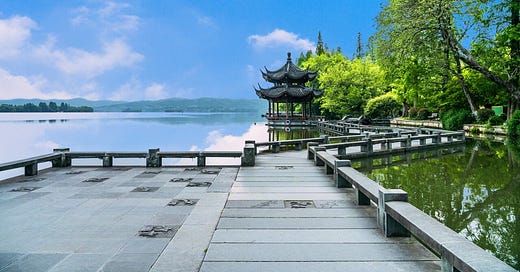Unfettered Wandering
Self-discovery is not to be obtained, but lived and experienced.
This is the 8th post on the “self-discovery” article series. As I close the series, I’ve realized that it has also been an inward experience of reflecting, searching, and questioning. And I am aware that there’s still much to explore in this never-ending journey of self-discovery.
I’ve come to believe that it is not where we arrive that matters but how we journey — unfettered, wandering, and free.
For my paid readers, I’ll reorganize the written pieces (perhaps write a short review or introduction) in this series so you can easily find them in one piece. These materials will not end here, as I’m working to improve them further. So, please stay tuned.
For my unpaid readers, feel free to enjoy and comment on other pieces I’ve put out, including the entire “The Wisdom of Lao Tzu” letters and other public posts. Hopefully, one day, I’ll see you inside the world of Chuang Tzu for inspiration, insights, and personal improvement.
Starting next week, I’ll work on theme-based pieces on Chuang Tzu’s parables. The idea is to extract meaning from the philosopher’s stories and insights to improve our lives in an enjoyable and easily accessible way. I think this requires additional ways beyond blog posts or newsletters. So, let's see how this endeavor unfolds.
Accepting life as a temporary journey in this world prevents us from forming excessive attachments to it. When we perceive our experience within the vastness of time, we see ourselves as ephemeral occurrences, destined to depart when the moment arrives. Yet, even while entangled with the inevitable changes of the world, we can still maintain inner peace and stillness.
Self-discovery begins with spiritual awakening and liberation. It is essential to examine how you perceive your relationship with yourself. Do you accept who you are? Can you reconcile with your past, shaping a coherent identity that allows you to navigate the world authentically?
Once awakened, you adopt the role of an observer, consistently and instantly. Your self, emotions, and perceptions no longer bind you because you are conscious and aware. You observe your actions and thoughts from that infinite spiritual realm.
On a pragmatic level, awakening means mobilizing your fullest potential in everyday life while enhancing your spiritual strength. This spiritual power will sustain you during moments of darkness. Life’s struggles and challenges become tests that you transcend. In this journey of self-discovery and self-reliance, you realize that simply by looking inward can you find a better version of yourself.
As you engage with the world as a spiritual being, you do not place yourself above others or attempt to persuade them to seek a higher spiritual realm. Awakening must be initiated and realized individually. Therefore, you live by your principles rather than imposing or contending with others.
Self-discovery is not a linear path, nor is it a destination to be reached. It is a continuous, evolving journey that mirrors the very nature of life — diverse, unpredictable, and ever-changing. In Taoist philosophy, this life experience is perhaps best captured by the notion of “unfettered wandering,” a state of being in which one moves through the world unbound by attachments, expectations, or the weight of self-imposed limitations. To wander unfettered is to live in harmony with the Tao, accepting the unpredictability of existence and embracing the freedom that comes from letting the heart roam.
Chuang Tzu, in the opening chapter of his book, speaks of wandering not as aimlessness but as a metaphor for spiritual liberation. This spiritual liberation is a recognition to preserve one’s individuality, a gesture to refuse to subject oneself to the pressure of conformity and not to be defined by others.
To wander freely is to be unattached to outcomes, to move through life with a sense of openness and spontaneity. But this freedom is not simply a rejection of external structures. It is establishing an inner spiritual order to reevaluate everything on the outside. It is an inward transformation, a reordering of the mind and spirit that allows us to roam naturally, without the burden of societal conditioning or excessive pursuits.
Fundamentally, aligning yourself with the Tao also means embracing a state of spontaneous freedom, accessible to every person. By perceiving the value of naturalness and the natural order, you come to live in wu-wei—pursuing spontaneous actions—which guides you through your transformation, allowing you to live a natural path.
Keep reading with a 7-day free trial
Subscribe to Taoism Reimagined to keep reading this post and get 7 days of free access to the full post archives.





